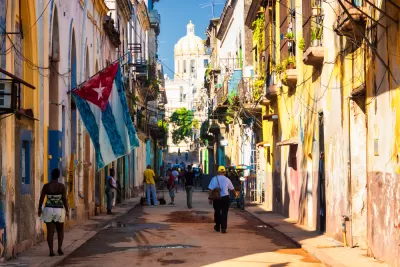Cuba and its capital city of Havana are experiencing several, simultaneous revolutions. The opportunity for residents is also an opportunity for developers and architects, as well as a challenge for planners.

Oliver Wainwright provides a dispatch from Cuba, documenting the changes apparent there as the country opens to the outside world in unprecedented ways.
The first sign of change reported by Wainwright: Wi-Fi hotspots. "In a country where the internet is still forbidden in private homes and an hour checking emails at an internet cafe can cost nearly a week’s wages, the arrival of five designated Wi-Fi zones in Havana has been nothing short of revolutionary," writes Wainwright.
Then there is the effect of over 3 million tourists coming to Cuba last year, "boosted by a sharp increase in the number of US visitors, which has surged by almost 40% since Obama ushered in a thaw in diplomatic relations at the end of 2014." According to the International Monetary Fund, that number could climb to 10 million if the United States lifts its 1960 trade embargo.
The challenge of designing and planning for a potential deluge of tourism business and new economic opportunity is the central concern of the article. Luxury hotel developers are already pouring money into the country, especially in Havana, and architects are chomping at the bit to leave their mark on the country. For instance, "Frank Gehry sailed into Havana in December, aboard a streamlined yacht he designed for himself, here to 'offer his expertise to Cuba' according to a government statement." The soundbite that leaves most lasting impression is included in the headline. Local Miguel Padrón says:
We will have many divas and divos arriving with their very nice drawings….But as a society, we desperately need to improve our capacity to debate and discuss these plans. The challenge is how to capture the potential of the market in the right way, to learn how to negotiate with foreign investors. Havana is now the big cake – and everyone is trying to get a slice.
FULL STORY: Cuba for sale: ‘Havana is now the big cake – and everyone is trying to get a slice’

Maui's Vacation Rental Debate Turns Ugly
Verbal attacks, misinformation campaigns and fistfights plague a high-stakes debate to convert thousands of vacation rentals into long-term housing.

Planetizen Federal Action Tracker
A weekly monitor of how Trump’s orders and actions are impacting planners and planning in America.

In Urban Planning, AI Prompting Could be the New Design Thinking
Creativity has long been key to great urban design. What if we see AI as our new creative partner?

King County Supportive Housing Program Offers Hope for Unhoused Residents
The county is taking a ‘Housing First’ approach that prioritizes getting people into housing, then offering wraparound supportive services.

Researchers Use AI to Get Clearer Picture of US Housing
Analysts are using artificial intelligence to supercharge their research by allowing them to comb through data faster. Though these AI tools can be error prone, they save time and housing researchers are optimistic about the future.

Making Shared Micromobility More Inclusive
Cities and shared mobility system operators can do more to include people with disabilities in planning and operations, per a new report.
Urban Design for Planners 1: Software Tools
This six-course series explores essential urban design concepts using open source software and equips planners with the tools they need to participate fully in the urban design process.
Planning for Universal Design
Learn the tools for implementing Universal Design in planning regulations.
planning NEXT
Appalachian Highlands Housing Partners
Mpact (founded as Rail~Volution)
City of Camden Redevelopment Agency
City of Astoria
City of Portland
City of Laramie



























